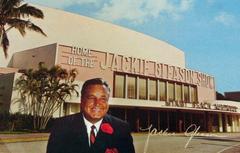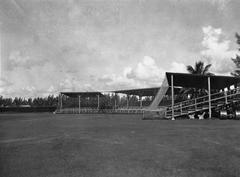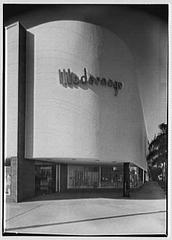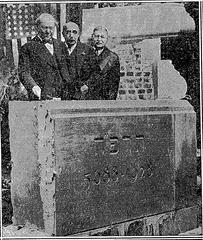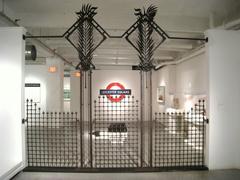
Temple Emanu-El Miami Beach: Visiting Hours, Tickets, and Historical Significance
Date: 03/07/2025
Introduction
Temple Emanu-El Miami Beach stands as a remarkable symbol of Jewish heritage, architectural splendor, and vibrant community life in the heart of Miami Beach, Florida. Established in the late 1930s, it is the oldest Conservative Jewish congregation in the city, tracing its origins to Congregation Jacob Joseph, founded in 1938. Today, Temple Emanu-El is not only a place of worship but also a cultural and social hub, hosting diverse events that celebrate Jewish tradition and foster interfaith dialogue.
Architecturally, Temple Emanu-El is renowned for its distinctive blend of Byzantine and Moorish Revival styles, its commanding copper dome, and an interior rich with stained glass and artistic details. Visitors can expect an immersive experience that encompasses history, architecture, and community programming.
This guide offers everything you need to plan your visit: practical information on visiting hours, ticketing, accessibility, tours, and nearby attractions. For up-to-date details and tour bookings, refer to the official temple website and Miami Beach’s cultural resources (Synagogues360, Miami and Beaches Official Guide, Temple Emanu-El Official Site).
Temple Emanu-El: History and Architectural Legacy
Early Foundations
Temple Emanu-El was established as Miami Beach’s Jewish population expanded in the late 1930s. Following a split from Congregation Jacob Joseph, which maintained Orthodox traditions, Temple Emanu-El adopted Conservative Judaism, shaping the city’s religious landscape (Synagogues360).
Architectural Highlights
Completed in 1948, the sanctuary was designed by renowned architect Percival Goodman, often referred to as the “father of modern American synagogue architecture.” The building’s style uniquely combines Byzantine and Moorish Revival influences, most notably in its 100-foot-high copper dome—a defining feature of Miami Beach’s skyline (Tripomatic).
The synagogue’s exterior pairs monumental forms with delicate Moorish arches and intricate decorative details. Inside, the sanctuary is adorned with vibrant stained glass, mosaic floors, and custom furnishings crafted by leading artists of the time (Art Deco Buildings Blog).
Community Significance
Following World War II, Temple Emanu-El became a central institution for Miami Beach’s growing Jewish community. Today, it continues to host religious services, concerts, lectures, and community gatherings, fostering both cultural identity and interfaith engagement (FeverUp).
Visitor Information
Location
Address: 1701 Washington Avenue, Miami Beach, FL 33139
Situated in the heart of Miami Beach, Temple Emanu-El is within walking distance of Art Deco hotels, restaurants, the Miami Beach Botanical Garden, and the Bass Museum of Art.
Visiting Hours
- Monday to Friday: 9:00 AM – 5:00 PM
- Sunday: 10:00 AM – 3:00 PM
- Saturday: Closed for tours (Shabbat services in session)
- Holidays: Closed on major Jewish holidays
Note: Hours may vary during special events or for security reasons. Always check the official website for updates.
Tickets and Admission
- Self-Guided Visits: Free of charge; donations appreciated
- Guided Tours: Available by appointment, often for a nominal fee
- Special Events: Tickets may be required; purchase in advance for concerts and immersive performances
Accessibility
Temple Emanu-El is fully wheelchair accessible, with ramps, elevators, and accessible restrooms. Assistive listening devices are available upon request. Service animals are welcome.
Dress Code and Etiquette
Visitors are asked to dress modestly, covering shoulders and knees. Men may be asked to wear head coverings in certain areas. Silence and respect are expected during services. Photography is generally permitted only outside of worship times.
Guided Tours and Educational Programs
Guided tours offer in-depth insights into Temple Emanu-El’s history and architecture. Tours are typically offered on Tuesdays and Thursdays at 11:00 AM and 2:00 PM by advance reservation (Miami and Beaches Official Guide). Educational programs for all ages focus on Jewish heritage, art, and the synagogue’s community impact.
To book a tour: Visit the contact page or call ahead.
Facilities and Amenities
Temple Emanu-El’s complex includes the main sanctuary, a grand ballroom, classrooms, and meeting rooms. Amenities such as restrooms, water fountains, and seating areas are provided. Food and beverage concessions may be available during major events. Numerous dining options are also located nearby.
Safety, Security, and Travel Tips
- Security screenings and bag checks are standard, especially during events. Carry photo ID and arrive early.
- Parking is available in nearby municipal lots and garages; public transportation via Miami Beach Trolley and local buses is convenient.
- For accessibility needs or group arrangements, contact the temple in advance.
Nearby Attractions
Enhance your visit by exploring:
- Miami Beach Botanical Garden
- The Bass Museum of Art
- Lincoln Road Mall
- Art Deco Historic District
- Jewish Museum of Florida
- Iconic South Beach
Preservation and Legacy
Temple Emanu-El is recognized as a historic Miami Beach landmark. Ongoing restoration efforts preserve its architectural features, including stained glass and the central dome, ensuring its continued place in the city’s religious and cultural life (Synagogues360).
Frequently Asked Questions (FAQ)
Q: What are Temple Emanu-El’s visiting hours?
A: Monday to Friday, 9:00 AM–5:00 PM; Sunday, 10:00 AM–3:00 PM; closed Saturdays and holidays. Confirm current hours on the official website.
Q: Is there an admission fee?
A: No; self-guided visits are free. Guided tours and special events may have a fee.
Q: Is the synagogue accessible for visitors with disabilities?
A: Yes, including ramps, elevators, accessible restrooms, and assistive devices.
Q: Can I take photos inside?
A: Photography is allowed in public areas when services are not in session.
Q: Are guided tours available?
A: Yes, by advance reservation. Contact the temple to schedule.
Q: Where can I park?
A: Use the 17th Street Garage or nearby municipal lots.
Notable Facts and Figures
- Founded: 1938; sanctuary completed in 1948
- Architect: Percival Goodman
- Seating Capacity: Over 1,200 in the main sanctuary
- Dome Height: Approximately 100 feet
- Architectural Styles: Byzantine Revival, Moorish Revival, Miami Modern
- Historic Status: Miami Beach designated landmark
Final Tips and Call to Action
Temple Emanu-El Miami Beach stands as a living monument to Jewish heritage, architectural innovation, and communal resilience. Its blend of historic design and active programming makes it a must-see destination for architecture lovers, history enthusiasts, and cultural travelers.
For the latest updates on visiting, guided tours, and special events, visit the official Temple Emanu-El website or consult the Greater Miami Convention & Visitors Bureau. Download the Audiala app for guided audio tours and event notifications, and follow Temple Emanu-El on social media to stay connected with Miami Beach’s vibrant cultural scene.
Sources
- Synagogues360
- Miami and Beaches Official Guide
- Synagogues of the South
- Temple Emanu-El Official Site
- Greater Miami Convention & Visitors Bureau’s Official Guides




